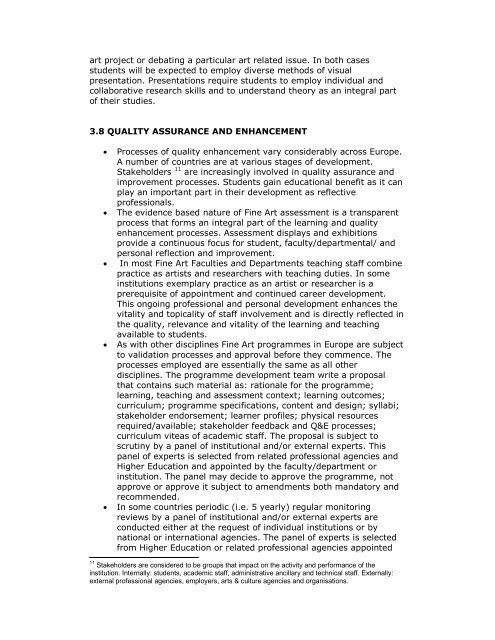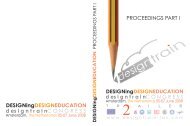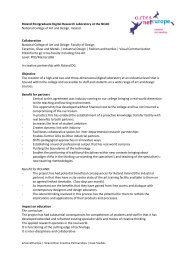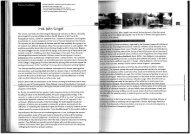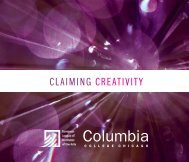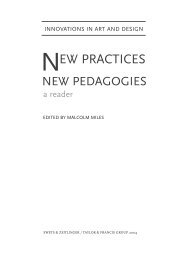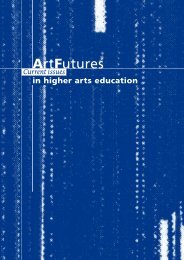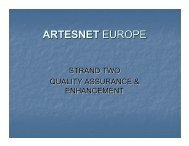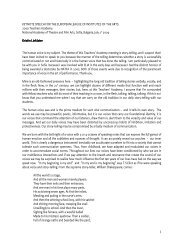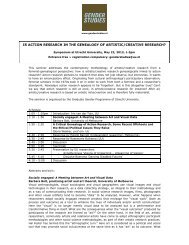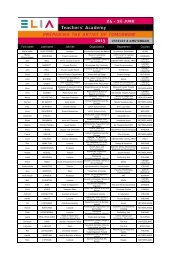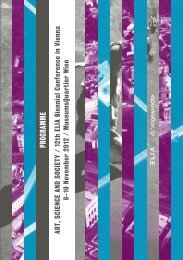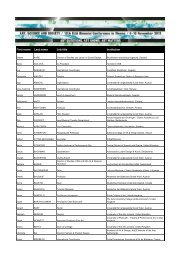CONTENTS FINE ART TUNING DOCUMENT - ELIA
CONTENTS FINE ART TUNING DOCUMENT - ELIA
CONTENTS FINE ART TUNING DOCUMENT - ELIA
Create successful ePaper yourself
Turn your PDF publications into a flip-book with our unique Google optimized e-Paper software.
art project or debating a particular art related issue. In both cases<br />
students will be expected to employ diverse methods of visual<br />
presentation. Presentations require students to employ individual and<br />
collaborative research skills and to understand theory as an integral part<br />
of their studies.<br />
3.8 QUALITY ASSURANCE AND ENHANCEMENT<br />
• Processes of quality enhancement vary considerably across Europe.<br />
A number of countries are at various stages of development.<br />
Stakeholders 11 are increasingly involved in quality assurance and<br />
improvement processes. Students gain educational benefit as it can<br />
play an important part in their development as reflective<br />
professionals.<br />
• The evidence based nature of Fine Art assessment is a transparent<br />
process that forms an integral part of the learning and quality<br />
enhancement processes. Assessment displays and exhibitions<br />
provide a continuous focus for student, faculty/departmental/ and<br />
personal reflection and improvement.<br />
• In most Fine Art Faculties and Departments teaching staff combine<br />
practice as artists and researchers with teaching duties. In some<br />
institutions exemplary practice as an artist or researcher is a<br />
prerequisite of appointment and continued career development.<br />
This ongoing professional and personal development enhances the<br />
vitality and topicality of staff involvement and is directly reflected in<br />
the quality, relevance and vitality of the learning and teaching<br />
available to students.<br />
• As with other disciplines Fine Art programmes in Europe are subject<br />
to validation processes and approval before they commence. The<br />
processes employed are essentially the same as all other<br />
disciplines. The programme development team write a proposal<br />
that contains such material as: rationale for the programme;<br />
learning, teaching and assessment context; learning outcomes;<br />
curriculum; programme specifications, content and design; syllabi;<br />
stakeholder endorsement; learner profiles; physical resources<br />
required/available; stakeholder feedback and Q&E processes;<br />
curriculum viteas of academic staff. The proposal is subject to<br />
scrutiny by a panel of institutional and/or external experts. This<br />
panel of experts is selected from related professional agencies and<br />
Higher Education and appointed by the faculty/department or<br />
institution. The panel may decide to approve the programme, not<br />
approve or approve it subject to amendments both mandatory and<br />
recommended.<br />
• In some countries periodic (i.e. 5 yearly) regular monitoring<br />
reviews by a panel of institutional and/or external experts are<br />
conducted either at the request of individual institutions or by<br />
national or international agencies. The panel of experts is selected<br />
from Higher Education or related professional agencies appointed<br />
11 Stakeholders are considered to be groups that impact on the activity and performance of the<br />
institution. Internally: students, academic staff, administrative ancillary and technical staff. Externally:<br />
external professional agencies, employers, arts & culture agencies and organisations.


